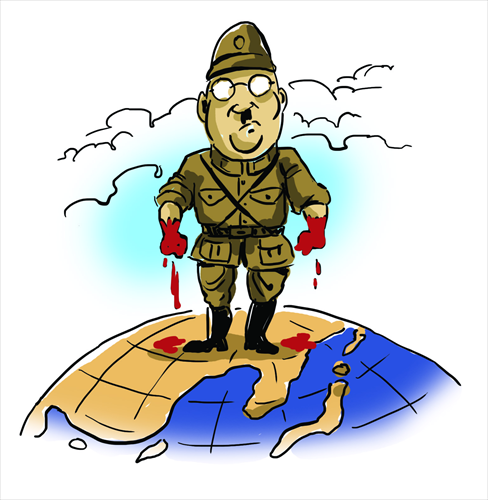US awareness of Japan’s war crimes still thin

Illustration: Liu Rui/GT
Japanese Prime Minister Shinzo Abe's recent visit to the Yasukuni Shrine produced a rare expression of displeasure from the US government, but the majority of US people have expressed little interest in this event.
This seems rather odd. After all, while vastly more Chinese, Filipinos and Koreans died at the hands of the imperial Japanese army, the Bataan Death March and other Japanese war crimes involving US prisoners are well documented.
The atrocious conduct of the Japanese military toward prisoners of war has been proven beyond doubt. And yet there is far less public outcry about Abe's visit than there was regarding former president Ronald Reagan's visit to the Bitburg cemetery in Germany, where the mere presence of SS soldiers resulted in a serious public scandal.
Much of the reason for this is bound up in the US' perception of Japan. Unlike Germany, Japanese war crimes received less emphasis in the postwar years, resulting in many Americans' view of Japan failing to acknowledge the fraught nature of Japan's wartime history. These factors have led to the US people drastically underestimating the impact of Abe's actions among Japan's neighbors. To these Americans, the idea that any nation could see Japan as a potential threat is simply incomprehensible.
The reason for this view is based on both the immediate postwar relationship between the US and Japan and the later economic and cultural interactions between the two nations.
First, while the success of the US occupation has been taken for granted in the US, large portions of the Japanese government were spared from facing war crimes trials, most notably the Showa Emperor. Japan never faced the massive cultural reexamination that transformed postwar Germany. Most importantly, it left the post-occupation government with a vested interest in avoiding a close examination of wartime acts.
As Japan became a cornerstone for the Far East policy of the US, especially during and after the Korean War (1950-53), the focus turned to ensuring Japan remain a stable ally. That resulted in downplaying Japanese actions during WWII. Perhaps most inexcusable was the concealment of the existence and activities of the now-notorious Unit 731 as well as the widespread use of chemical and biological weapons against Chinese soldiers and civilians. This willful blindness helped leave fertile ground for later revisionist and right-wing views of Japan's wartime actions.
And the Cold War isolated the Chinese people from the US. Much of the primary evidence of Japanese war crimes in China failed to make an impact on the US public. Japan was seen as the US' ally, and for that reason much of Japan's activities, especially those that did not involve US soldiers, were forgotten.
Unlike German war crimes, which continue to be widely popularized in modern culture, Japan's war crimes still remain on the fringe of awareness.
Another factor is how Japan and the US related to each other during the postwar era. Japan, although seen as an economic competitor by many Americans, was not seen as a geopolitical competitor.
In fact, many Americans still believe that Japan has no military, when in truth the Japanese Self-Defense Forces are one of the more powerful militaries in the Pacific.
Furthermore, the cultural imports of Japan, ranging from Japanese food to the anime that became such a popular subculture in the 1980s helped create an image of Japan that was far removed from the savagery shown during WWII.
Indeed, there are far more shows criticizing the US atomic bombings than there are focusing on the Nanjing Massacre. It is unsurprising that children who grew up watching Pokémon and other such shows might fail to understand the ambivalence many nations feel regarding Japan.
US educators and politicians should work to educate the US pubic about Japan's actions during WWII. This is not primarily to condemn Japan, but to come to a better understanding of how the events of the war continue to resonate among Japan's neighbors.
By doing so, the US may be able to position itself as an ally and friend in order to convince the Japanese people to engage in a serious reexamination of these events, untainted by denial or nationalistic justifications.
The author is a political writer based in Southern California. jgray22a@gmail.com